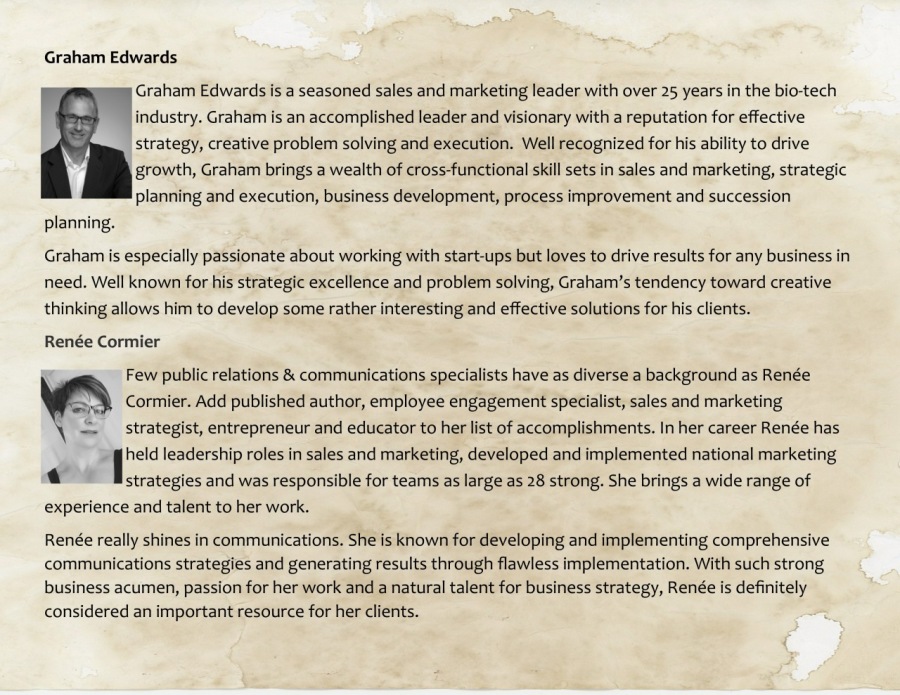Questions to help you mind your business... Question #3
This is the third in a series of thoughts and opinions by Graham Edwards and Renée Cormier — click here to read the backstory and inspiration (if only for the entertainment). It should be noted that neither of us have seen or discussed our answers before they are posted, which in our mind makes this all the more interesting.
In this blog series we will attempt to answer ten different questions business owners may need answered, using our individual and unique perspectives and approaches. It is our hope that this series will inspire both action and interaction. Please feel free to comment and ask more questions.

Question #3: Do I need a plan for my business?
Graham —
Answer: Yes (full stop).
iamgpe
PS: Whenever the discussion of business plans (or any plan for that matter) comes up there is always the same collection of considerations that make their way into the conversation…
i) One day Alice came to a fork in the road and saw a Cheshire cat in a tree. “Which road do I take?” she asked. ”Where do you want to go?” was his response. “I don’t know,” Alice answered. “Then,” said the cat, “it doesn’t matter.” — There is no need for a plan unless you know where you want to go.
ii) Plan format may depend on your audience (and in many cases they will tell you the format they prefer), or you can just download the “best business plan template ever” with a Google search — they all pretty well consist of the same components. The following nine plan components came from Guy Kawasaki of Apple fame and have worked as a nice framework when pitching a business plan to interested parties and investors:
i. The Problem — describe the pain that you are alleviating with a goal of getting the audience to “buy into” the situation. Avoid looking like a solution searching for a problem, and minimize citations from consulting studies about future size of the market.
ii. The Solution — explain how you alleviate this pain, and clearly illustrate what you sell and your value proposition.
iii. The Business Model — explain how you make money and who pays you; what are your channels of distribution and what your gross margins are. Generally, a unique, untested business model is a scary proposition for many so if you truly have a unique revolutionary business model, explain it in terms of familiar ones.
iv. Underlying Magic — describe the technology, “secret sauce”, or magic behind your product or services. Less text and more diagrams, schematics and flow charts work better; referencing white papers and objective proof of concept are helpful.
v. Marketing and Sales — explain how you are going to reach the market and your marketing leverage points. Convince the “audience” that you have an effective go-to-market strategy that will not break the bank.
vi. Competition — provide a complete view of the competitive landscape and never dismiss your competition. Everyone (customers, investors, employees) wants to hear why you’re good, not why the competition is bad.
vii. Management Team — describe the key players of your management team, board of directors and board of advisors, as well as your major investors. Don’t be afraid to present less than a perfect team — what’s important is whether you understand that there are holes and are willing to fix them.
viii. Financial Projections and Key Metrics — provide a five year forecast containing not only dollars but also key metrics such as number of customers and conversion rate. Do a bottom up forecast and take into account long sales cycles and seasonality. Making people understand the underlying assumptions of your assumptions (of your forecast) is just as important as the numbers you have “fabricated”
ix. Current Status — Explain the current status of the business (product and service), what the near future looks like, and your investment/OPEX considerations. Share the details of your positive momentum and traction, and align it with the vision of the business.
iii) “No battle plan survives contact with the enemy” (Helmuth von Moltke) or “Whatever can go wrong, will go wrong” (Murphy) — in other words, no matter how much time and thinking went into your plan, the moment it is implemented (and enters the real world) stuff will happen that wasn’t planned for, anticipated, or simply wasn’t thought of. This is a reminder to anyone formulating a plan (or asked execute it) that it is important to be adaptable, resilient, and have a sense of humour (because the universe sure does).
iv) Point iii) does not negate the need for a plan and its importance (see point i)) because you simply will never build what you want or get the support you need (i.e. investors, employees or customers) if you don’t have one. What is proving out time and time again however is that a top down plan (with all the executable trappings) just falls apart as the real world rushes in — mostly because the people on the front line are expected to follow the original plan when the situation suggests it is no longer the best course of action. More and more leaders are articulating a plan framework with a vision, goals, guiding principles of the business, and then empowering their employees; they are creating an environment that lets people rally their efforts around this framework (instead of a hard plan) and in doing so achieve creative and very successful action.
v) Your plan will most likely come in a number of different forms such as a document, a PowerPoint slide deck, or an elevator pitch. I want to add that you shouldn’t underestimate the importance of a well-rehearsed elevator pitch because when you tear away all of the formality of a plan it simply starts with the question, “So, tell me about your business and the opportunity?”
***
Renée —
Answer: Many moons ago, I was selling business coaching services and met a guy who started a communal office space business. At the time, this type of business was still very novel and he probably could have made a real success of it, but he didn’t. I wasn’t surprised to find his business failed within a year or two because when he told me about his business, he also told me that he wrote his plan on the back of a napkin. Now, I understand how your enthusiasm can make you believe that is a good idea, but it really isn’t. I’m quite certain that if he had actually taken the time to properly plan for his business, he would have created something worth replicating, or at least worth selling. Instead, he lost everything.
I know what you are thinking. There are plenty of small business people who never plan, never use advertising or social media and are still somehow successful. That is true. I call these people accidental business people. They are lucky enough to be profitable in spite of themselves. They have a good product and a market that seems to work for them, but they are still leaving a lot of money on the table. In fact, if you ask them a few questions about their business, you will be surprised to discover how unaware they are of the inner workings of their own business.
I once worked for a guy who paid me a good salary and when I asked him how much I needed to sell in order to justify my pay, he had no idea. I actually negotiated a salary and he didn’t even know for certain if he could afford to pay me! I soon discovered his receivables were a mess, he was paying to store old inventory in a dust free facility, the industry he worked in was facing serious decline, and the list goes on. I made him aware of a few of his problems so he was able to stay in business a little longer. Today, the side of the business I managed is closed and he continues to work his other niche, in spite of himself. I am quite certain that if he ever really took the time to properly plan for his business, he would have found better markets, more appealing products, developed efficient systems and ultimately would have created a more stable and profitable business.
When it comes to business plans, I can tell you that there are good plans and bad plans, and the amount of paper used to print them up has no bearing on their value. A good plan is concise, strategic, has time specific objectives and above all, is realistic. Any loan manager at a bank will tell you how frequently people submit business plans that have ridiculous financial objectives. A plan to double your sales in one year may not be realistic, but a 10 to 20 per cent increase may be perfectly attainable, depending on your strategy. Having said that, a weak strategy and/or poor execution won’t likely net you any growth. Work the Plan: Secrets to Successful Business Execution is a post I wrote about how to execute your plan. Since that is a huge part of the business battle, I suggest you take the time to read it. After all, a plan that gets stuffed in a drawer is as useless as a plan that is written on a paper napkin, or one that is not written at all.
So what can a plan really do for you?
Done properly, a plan will make your business stronger by allowing you to do the following:
1. Get a complete understanding of your business and its industry.
2. Analyse your competition.
3. Discover opportunities.
4. Develop clear cut objectives.
5. Develop a strategic approach to growth.
6. Help you drive the right initiatives.
7. Save time by not wasting your effort on fruitless tasks.
8. Integrate efforts to achieve common goals across your company.
9. Save you money.
10. Make you money.
11. Unite your workforce.
In my opinion, every business plan has to be based on research. Taking the time to assess your market and competition will prove invaluable. I know that can be a pain in the neck, but you need to do it. You also need to include a SWOT analysis (strengths, weaknesses, opportunities, threats) and set goals based on what you have uncovered as opportunities. Sorry for going crazy on the acronyms, but goal setting basics include a SMART requirement (specific, measurable, achievable, relevant and timed). Once you have those two elements in place, the rest flows more naturally.
Business Development Canada (BDC) offers a free business plan template and sample kit that you can download. I like this kit because it is quite comprehensive. I don’t need to reinvent the wheel for you. It’s been done, so if you want an excellent template to follow, just download it. If you need some help with your plan, let us know. That’s what Graham and I love to do!
Thanks to the social media platform beBee, Renée Cormier & Graham Edwards developed a business relationship and friendship that typically involves regular meetings, goal setting sessions, etc. Our meetings often provide the fuel for plans around business strategy, blog ideas and more.

""
Articles from Graham🐝 Edwards
View blog
Decades of sitting behind desks, in airplanes or in a car has blessed me with very tight hips which, ...

In my part of the world the COVID-19 pandemic has become manageable and the normality of working alo ...

Recently I thought I had reached a level of wisdom that I could offer thoughts on a number of things ...
Related professionals
You may be interested in these jobs
-
Site Manager
Found in: beBee S2 CA - 1 week ago
BEST - For A Cleaner World Dorchester, Canada Full timeEstablished in 1956, BEST is a Canadian janitorial company that aims to create a cleaner world by focusing on communities' social, environmental, and economic impact. We have been recognized by Deloitte as one of Canada's Best Managed Companies and by Waterstone Human Capital as ...
-
Licensed Esthetician
Found in: Talent CA C2 - 2 days ago
Chatters St. John's, Canada Full timeChatters culture of Style Happy goes beyond just looking good. It's about feeling and doing good. It's about attitude and self-expression. · Do YOU have what it takes to be Style Happy? · We know how important it is to keep our employees happy, because when they are happy, it m ...
-
Conseiller bancaire
Found in: Talent CA C2 - 4 days ago
Banque Nationale Shediac, Canada PermanentType de contrat Permanent Temps plein/Temps partiel? Temps plein Lieu: Shediac, Nouveau Brunswick Ville Shediac Province/État Nouveau Brunswick Domaine d'intérêt: Conseils et services en succursales Domaine d'intérêt Conseils et services en succursales Une carrière de conseill ...




Comments
Graham🐝 Edwards
6 years ago #2
Thanks for the comment Jerry Fletcher... what an interesting concept... worth putting some "blogging thought" into... lol
Jerry Fletcher
6 years ago #1